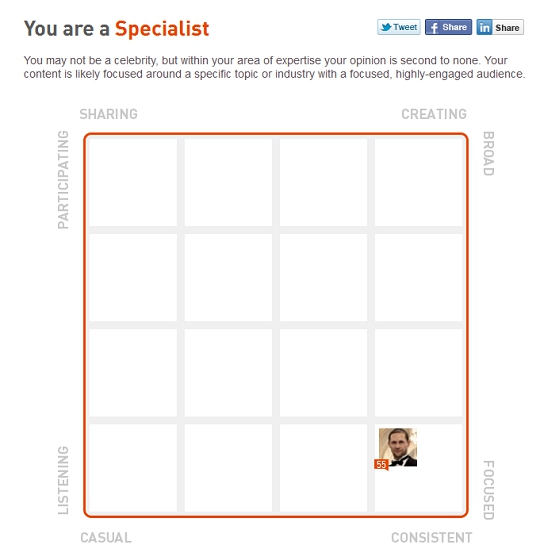UPDATE: Regretfully, Klout seized to exist in 2018, six years after the writing. My score went up to 64 by that time. Here’s what happened to it.
Refreshing my knowledge on social media earlier this week, I came across a service that although having run for four years already, started to catch some high winds last year from CNN, New York Times, BusinessWeek, and the like. It generated a lot of controversy and criticism, yet became powerful enough to make some employers use it during a job interview, seminar organizers to help identify the speakers, and PR managers to narrow down their VIP lists at social events. Why? The service, called Klout, claims to express your digital age involvement, positioning, and expertise in a single number — a measurement of your online social score, based on your influence within modern social networks. By some, the Klout score may be allied to the “digital age credit score”. Admittedly, I have not heard about it till now, and I was anxious to run the check on myself…
Klout developed an algorithm to aggregate and quantify your online presence and interactions within 13 (and growing) social networks, mainly focusing on the current hubs — Facebook, Twitter, LinkedIn, and Google+. Notably, it doesn’t just count the number of friends, connections, or tweets. It looks at the number of comments, “likes”, retweets, mentions, etc. that your content generates. In other words, to what extent you can influence an audience, and what that audience is. An association that comes to my mind is how Google decided to rank the search results back in the days — instead of just returning a random pile of close matches to search keywords or phrases, it ingeniously thought about measuring popularity of the found webpages, i.e. counting the number of other sites linking to it on an assumption that popular sites “know it better”, or are just more relevant and to the point, thus placed higher in the search results.
The main shortcoming of this approach, criticized by the masses, is taking the offline influence out of the equation, thus generating an inadequate measurement. A tech-savvy and outgoing student may be easily deemed as more competent and influential than his professor. An amateur may score twice as high as the industry leader who does not bother with a Facebook profile. Or, you may become less of a thought leader if you take on a two-month humanitarian mission and temporarily cut the connection with the web… And yet, while the assessment is far from being perfect and comprehensive, I believe it has a revolutionary potential and will develop into a mainstream application in many markets, offering a unique way to measure one of the key qualities, and providing a new layer of social status of the digital era. Perhaps, many of us will be forced to pay attention to this new “credit score”… Just as its counterpart, it can be both misleading and securing, both a curse and a blessing.
So, take the following with a grain of salt. Few days after signing up, my score today is 55 (UPDATE: it went up to 64 prior to the service termination). This is what Klout researched about me: “You are a Specialist. You may not be a celebrity, but within your area of expertise your opinion is second to none. Your content is likely focused around a specific topic or industry with a focused, highly-engaged audience.“
Recommended reading:
CNN: Measuring influence online: A Q&A with Klout’s CEO
BusinessInsider: The TRUTH About Your Klout Score: How Your Phony Number Is Calculated
New York Times: Are You a V.I.P.? Check Your Klout Score
BusinessWeek: Should You Care How High Your Klout Score Is?


![Zorz Studios Invited to Attend Facebook's Meta Boost Gather in Washington, DC [Press Release] by Zorz Studios Zorz Studios Invited to Attend Facebook's Meta Boost Gather in Washington, DC [Press Release] | Zorz Studios](https://zorzstudios.com/wp-content/uploads/2022/05/Meta-Invited-Boost-Gather-2022.jpg)


